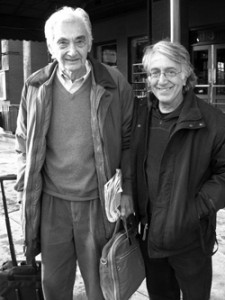
As we approach a new calendar year, we revisit Howard Zinn’s warmth, humor, and optimism in this interview with David Barsamian from July 1997. Zinn discusses being considered non-scholarly in the academic world (“…if you write stuff that an ordinary person can read, you’re suspect”), the notion of a pure well of academe (“a well that I would argue was itself poisonous. It perpetuated an education that left out large numbers of the world’s people”), and how social change happens (“You never know what spark is going to really result in a conflagration”). Originally published in The Progressive as “Outside the Classroom: Interview with David Barsamian,” the following is excerpted from The Historic Unfulfilled Promise.
______________________________________________
Q: Do you miss teaching?
Zinn: I miss the classroom and the encounter with students. But I’m not completely divorced from that situation, because now that I’m not teaching in a formal way, I do go around the country and speak to groups of young people, and do a kind of teaching. I love to speak to high school students. As a result, I don’t miss teaching as much as I might have if I simply retired from teaching and played tennis.
Q: Why do you think so many of your colleagues want to just busy themselves with their scholarship and churn out papers and attend conferences? I’m not saying that doesn’t have any value. But when it comes to being “out there,” to being engaged with what’s happening in the streets, in society, they don’t feel it’s appropriate.
Zinn: In our society, there’s a powerful drive for safety and security. Everybody is vulnerable because we are all part of a hierarchy of power. Unless we’re at the very, very top, unless we’re billionaires, unless we’re the president of the United States, unless we’re the boss, and very few of us are bosses, we are somewhere on some lower rung in the hierarchy of power. If somebody has power over us, somebody has the power to fire us, to withhold a raise, to punish us in some way.
Here in this rich country, so prideful of the economic system, the most clear-cut thing you can say is that everybody is insecure. Everybody is nervous. Even if you’re doing well, you’re nervous. Something will happen to you. In fact, the people who are doing fairly well, the middle class, are more nervous than the people at the bottom, who know what to expect. The academic world has its own special culture of conformity and being professional. Being professional means not being committed.
It’s unprofessional to be a teacher who goes out on picket lines, or who invites students out on picket lines, unprofessional to be a teacher who says to students, “Look, instead of giving you a final exam of multiple choice questions asking you who was president during the Mexican War, your assignment is to go out into the community and work with some organization that you believe in and then do a report on that.”
And you will stand out. You will stick out if the stuff you write is not written for scholarly journals but is written for everybody. Certainly the stuff written for scholarly journals is deliberately written in such a way that very few people can read it. So if you write stuff that an ordinary person can read, you’re suspect. They’ll say you’re not a scholar, you’re a journalist. Or you’re not a scholar, you’re a propagandist, because you have a point of view. Of course, scholarly articles have a point of view. They have an agenda. But they may not even know they have an agenda. The agenda is obedience. The agenda is silence. The agenda is safety. The agenda is “Don’t rock the boat.”



